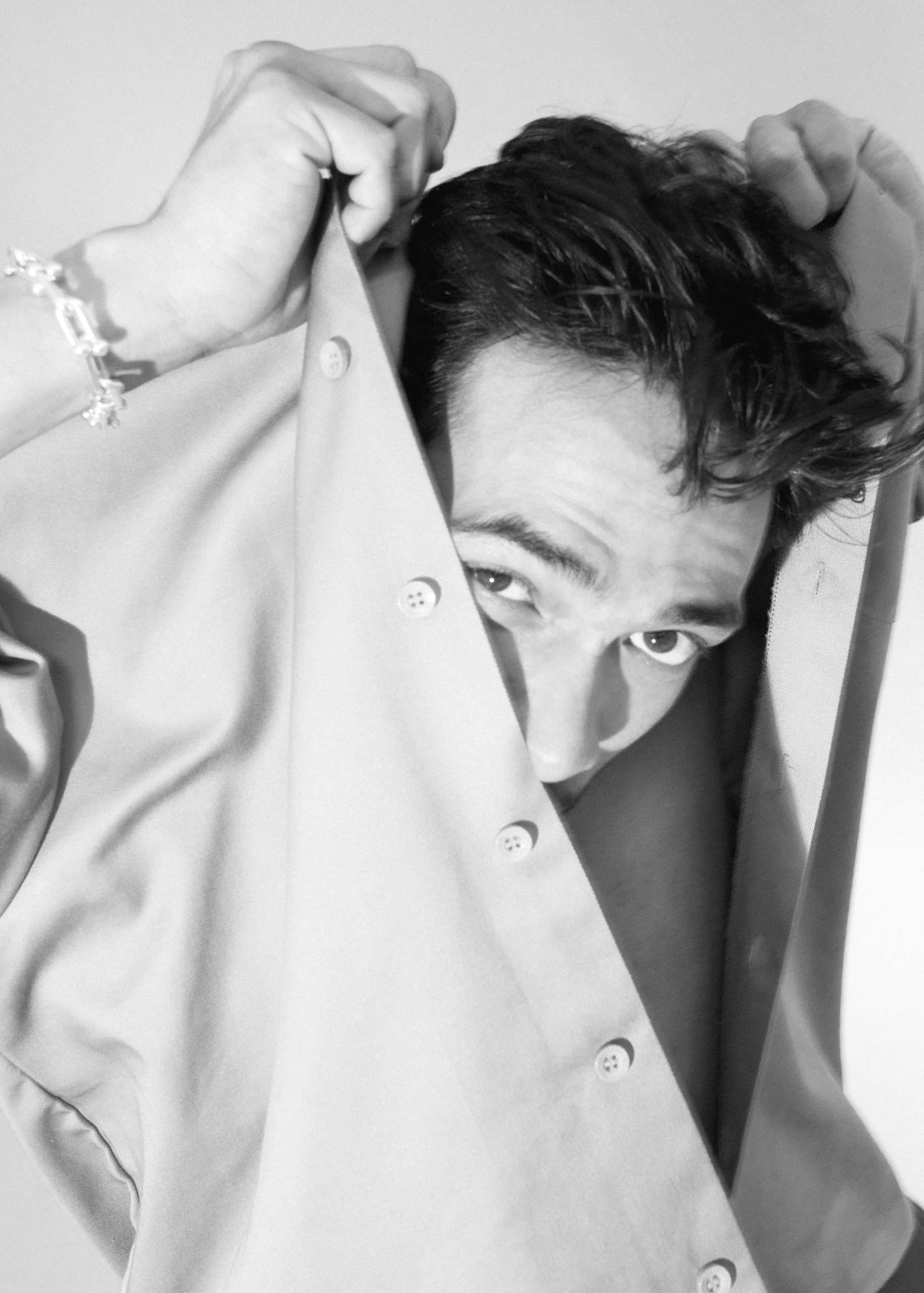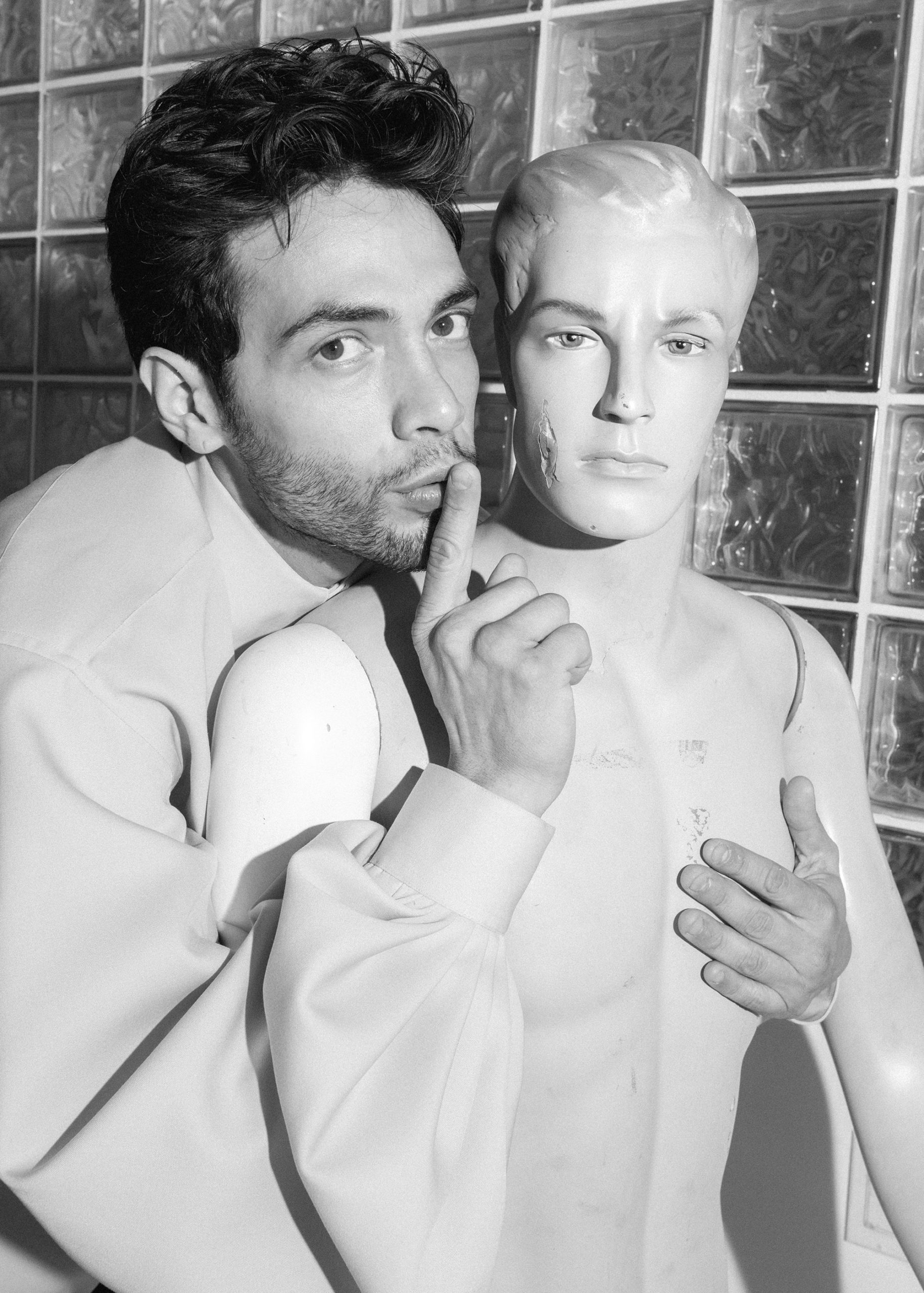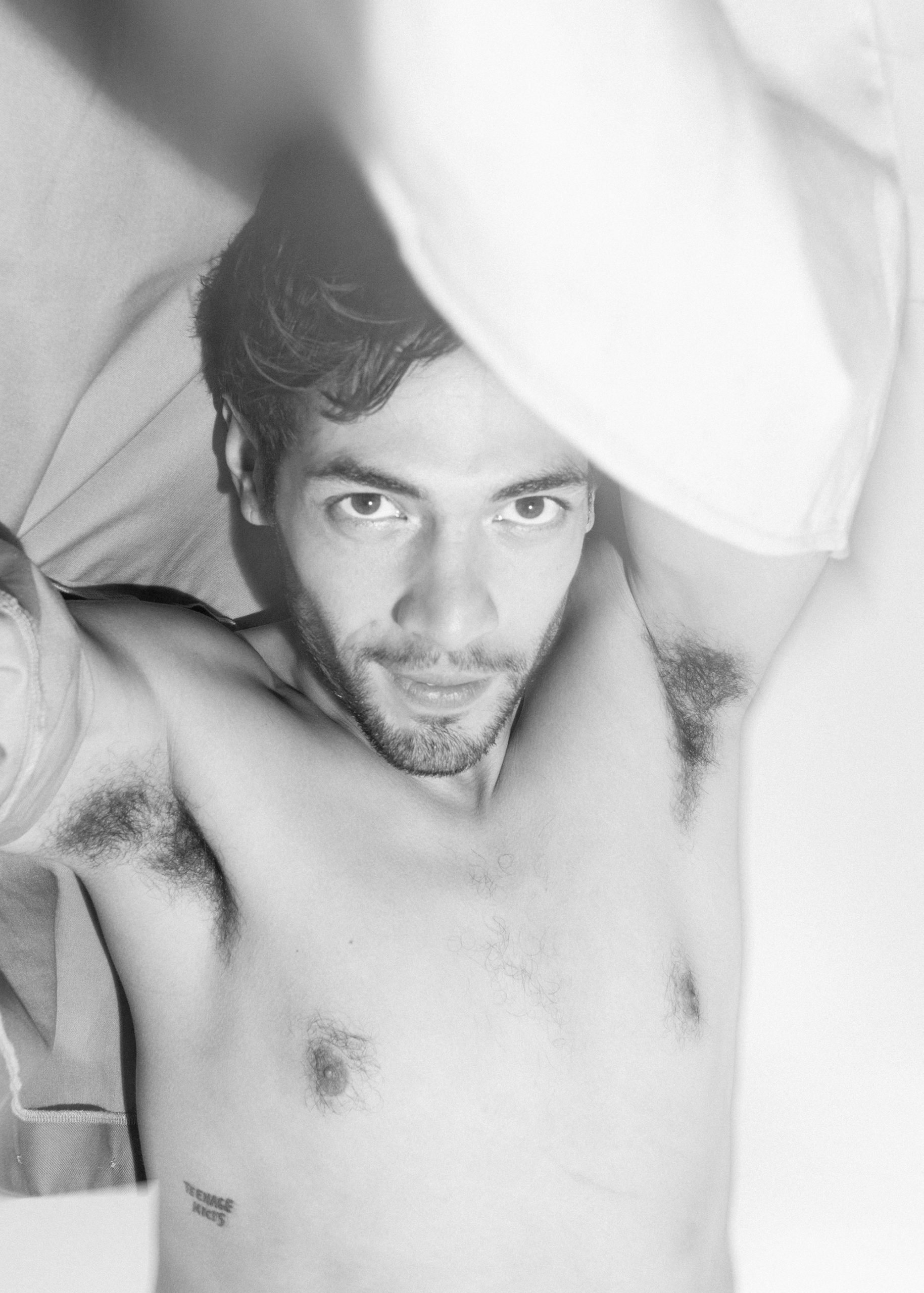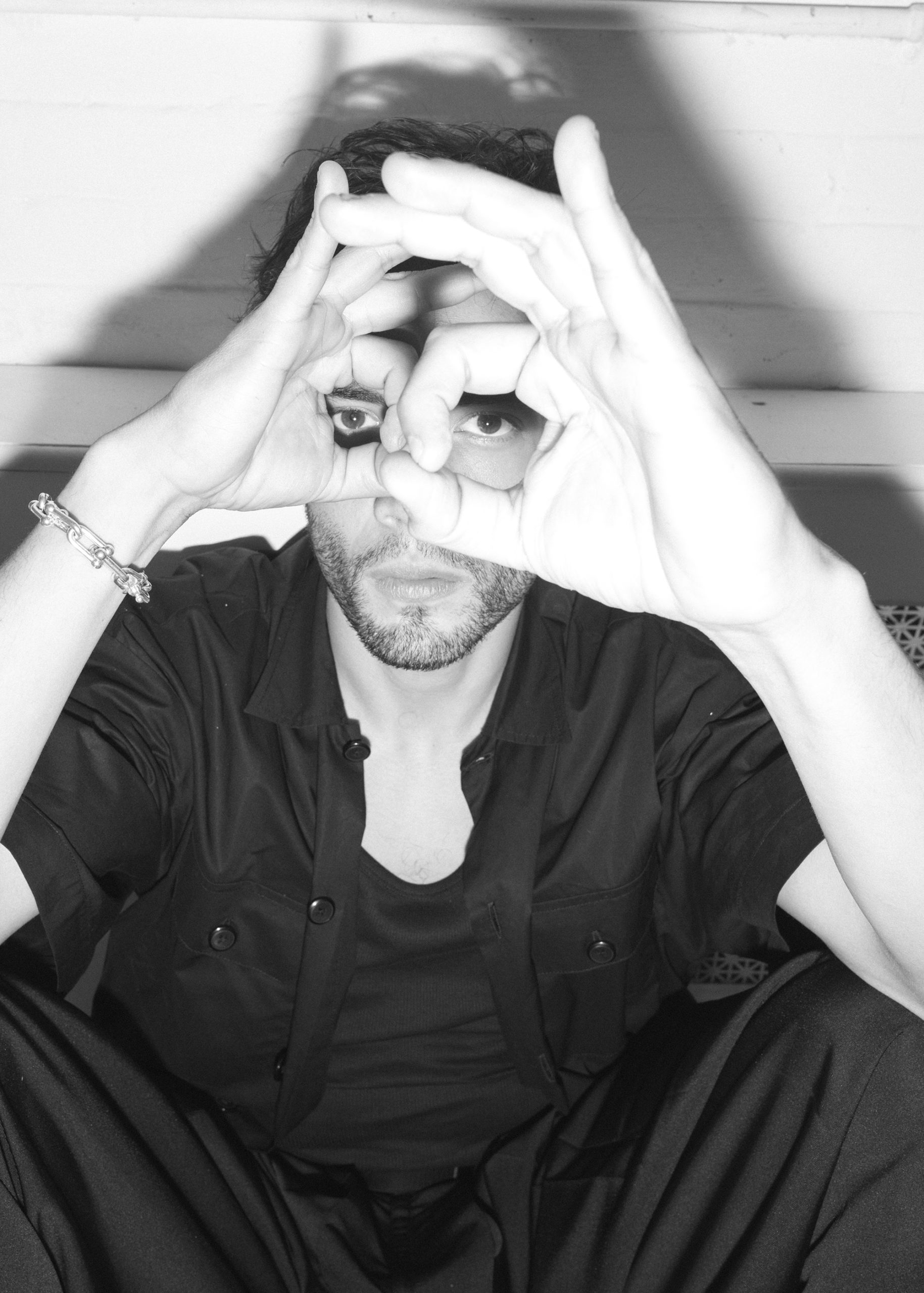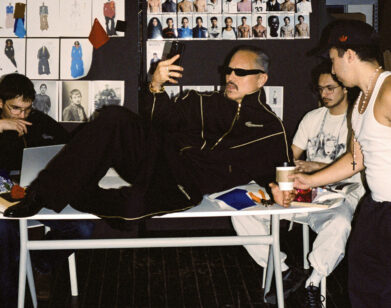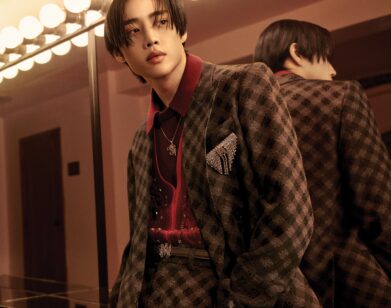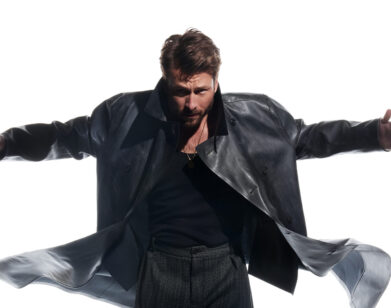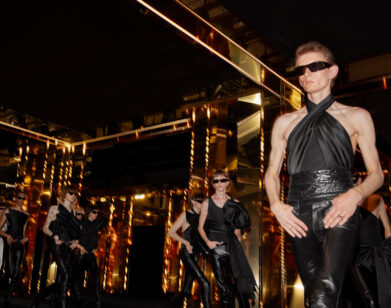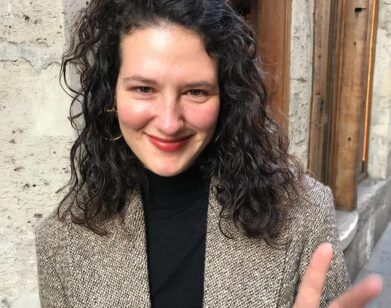BREAKOUT
“Brace Yourself”: Diego Calva Gets Grilled by Margot Robbie
It’s game on for Diego Calva, the Mexican actor who’s about to go worldwide as the star of Damien Chazelle’s three-hour extravaganza Babylon. The role marks Calva’s first on an American movie set, just like his character Manny Torres, an immigrant trying to score big in 1920s Hollywood. Joining Calva for the wild ride are Brad Pitt, Tobey Maguire, Olivia Wilde, Jean Smart, and Margot Robbie, who got on the phone with the up-and-comer to take his temperature before he blows up.
———
MARGOT ROBBIE: I’m so excited because I hate being interviewed, and I love that the tables have turned. I’m taking my role very seriously, so brace yourself.
CALVA: [Laughs] Nice.
ROBBIE: My first very question is, when am I going to meet your mom?
CALVA: She’s coming to the premiere. Just carry a little packet of Kleenex because she’ll be crying with excitement. I introduced her to Damien Chazelle and she grabbed him and started crying.
ROBBIE: [Laughs] Other than the emotional response that she keeps having, how is she feeling about it all?
CALVA: She doesn’t yet understand the magnitude of what’s going on. Me neither, so we’re in the same spot.
ROBBIE: What about the rest of your family and friends back home? Is everyone not making a big deal of it because they don’t yet know how much of a big deal it is? Or are they freaking you out and being like, “Your life is about to change! Don’t forget us!”
CALVA: We try to not talk about it a lot. The questions are more like, “Margot Robbie, is she nice? Brad Pitt, is he cool?”
ROBBIE: You’ve done a ton of work back in Mexico, so are your friends at home predominantly related to the film industry, or not at all?
CALVA: I have a lot of friends in the industry. The director who made my first film, for example, said, “You owe me. Now you’re going to say in interviews that Damien Chazelle changed your life, but actually it was me! I discovered you!”
ROBBIE: Let’s give a moment to all the people who really believed in you from the beginning, well before Babylon came into your life. Who are those people?
CALVA: My mother, of course; my best friends; my manager; and [the director] Julio Hernández Cordón.
ROBBIE: We just wrote your Oscar acceptance speech, so this has been a productive call already. Speaking of the Oscars, is that something you ever dreamed of attending? How do you feel about the idea of potentially going to award shows?
CALVA: When Guillermo del Toro, Alejandro González Inárritu, and Alfonso Cuarón were winning Oscars, I was about to get into script-writing and movie direction in college. I remember dreaming about winning my first award with a little short film, trying to give my speech to myself in the bedroom. So yeah, of course I’ve been dreaming of that. Now if I go it’s as an actor, not as a director, but I have a lot of time. We’ll see in ten years.
ROBBIE: Thinking of the nice opportunities that are going to come, do you have any bucket-list directors that you want to work with?
CALVA: I’ve been thinking about this a lot because now I really believe that everything’s possible. I would like to work with Greta [Gerwig]— who you just worked with—and with Noah [Baumbach]. I really, really want to work with Guillermo del Toro. He’s the sweetest guy. I’d love to work with Leos Carax, the French director, and with the director of The Square and Triangle of Sadness [Ruben Östlund].
ROBBIE: Dreaming big, no harm in that. Were there any films that you saw growing up where you were like, “I have to do that”?
CALVA: Goodfellas changed my life. Dog Day Afternoon is another. My grandmother loves Meryl Streep, so I started watching all her films because of that. I remember watching, for example, Out of Africa, The Deer Hunter—I’m a movie fan because of my grandparents.
ROBBIE: That’s amazing. Obviously, you’ve been exposed to brilliant films at a young age. Were there aspects of Manny that you found easy to access, and maybe that you had in common? And on the flip side, were there aspects of him that didn’t come to you naturally?
CALVA: My first day on a Hollywood set, we were shooting his first day on a Hollywood set. There were a lot of aspects of his story where I could put a mirror between me and him. Like meeting Brad Pitt and working with Margot Robbie—well, Manny is also meeting all these famous actors. And when he starts to literally go crazy because he’s so in love, I kept remembering that when I was a child, I too was very dramatic. When my mother said no to a toy I wanted, I was like, “My mother doesn’t love me. This is the end. I’m going to move out of my house. I don’t want to see her again.” The only thing I can’t relate to with Manny is that he is next-level smart. He can get away with any situation and improvise, solve it.
ROBBIE: You don’t think you’re like that?
CALVA: Oof, I don’t know.
ROBBIE: Well, let’s hope you’re never put in a predicament where you have to pull a trick out of your back pocket the way Manny does. But I definitely think you’re very smart and your mind does problem-solve quickly. Like the fact that you could improvise on set the way you could. That’s already impressive, let alone English being your second language. And you were improvising funny lines—that’s so hard to do. I think you’re being too humble.
CALVA: Thank you.
ROBBIE: I found it really hard to leave this job behind in the end. I get sad at the end of every job, but this one was different. I’d become so entwined with Nellie, I couldn’t bear the thought of not going back to the set. How did you feel?
CALVA: I just watched the film for the first time, and it reminded me of the first time I watched Spider-Man when I was 8 or 9 years old. I lived in that universe for weeks. When I finished shooting Babylon, and now when I finished seeing it for the first time, I want- ed to stay in that universe, too. I wanted to keep being Manny and living there, and being in love with Nellie, and working with you. So of course, it was hard.
ROBBIE: It sounds like we would’ve been really good friends when we were kids. I was exactly that kid as well, so dramatic and obsessed with films. What was your favorite day on set?
CALVA: Probably the first day, because I got to ride a horse in front of 300 extras. I was so nervous, but I just went for it. I remember some of the extras saying, “You got it!” And I was like, “Oh, I can do this! Let’s go for take two!” That felt great. I’ve never been in front of so many people clapping for me. It was scary but amazing.
ROBBIE: That is the craziest first day any actor could ever have! I wasn’t even in that scene, but I came to set that day because I was like, “I don’t know if I’ll ever be on a set again where there are hundreds of extras and you’ve got Spike [Jonze] pretending to be a director, being directed by Damien. This is so insane.” I wrote down everything at the end of the day, like, “Today was the best day I’ve ever experienced on a film set.” I can’t believe that was your first day! Back to Damien—I was just unpacking a box and found a pile of his DVDs that I need to return, and it struck me again what an absolute cinephile he is. Did he suggest any movies to watch in preparation?
CALVA: We watched some silent films, we studied Charlie Chaplin, and he gave me a lot of Al Pacino movies.
ROBBIE: Do you have a favorite silent film? There are so many brilliant ones, but I feel like a lot of people might not watch them because they think they’re going to be boring, and they’re not. I’ve watched some silent films that I’m like, “This is more entertaining.”
CALVA: Exactly.
ROBBIE: It’s got more of an art to it. Do you have any favorites?
CALVA: Any Buster Keaton film. For me, he’s like putting Tom Cruise, Eddie Murphy, and all the talent of all kinds of modern actors into one guy, someone who could do stunts, be funny, be dramatic.
ROBBIE: If you could say to someone, “You need to watch these three Mexican films,” which ones would you pick?
CALVA: I’d say Los Olvidados, which is by the Spanish director Luis Buñuel, but he did it here in Mexico. Also La Fórmula Secreta from Rubén Gámez.
ROBBIE: What decade are these films?
CALVA: Los Olvidados is from the ’50s, and La Fórmula Secreta is one of the first experimental films from Mexico, from the ’60s. It’s the first time a lot of Mexican writers—not script writers, but writers and poets—came together to make a movie. It opened a lot of doors here. And another film is I Promise You Anarchy [Te Prometo Anarquía]. My first film. Why not?
ROBBIE: Well done. I love that you threw that in there. While filming Babylon, did you feel like Damien’s directing style ever shifted?
CALVA: Damien has the biggest toolbox I’ve ever seen. He worked in so many different ways. I remember when you were dancing, I saw Damien in front of the monitor moving like a conductor, like he was able to direct an orchestra. He works with music as the lead of the movie, in a way. When he knows what he wants, there’s no question, but he’ll also ask, “What do you feel like? What do you think? Do you want to change something?” I changed almost half of the lines of the script with him.
ROBBIE: Yeah, it’s funny. He’s so incredibly specific with some things. I remember one line he was like, “No, no, no. The inflection goes up. Say it like this.” And then with other things, like when we have that cocaine scene in the bathroom at the Hearst party, he was like, “Just do something.” And we were like, “What?” And then we obviously—
CALVA: Did something. [Laughs]
ROBBIE: [Laughs] Yeah. But I really like that he works on both ends of the creative spectrum. It’s either very technical and specific or it’s completely abstract and freestyling. I find that so cool. Okay, so I imagine when this movie comes out, the world is going to be your oyster, because I think people are going to be so amazed by you, and so excited that you’ve hit Hollywood in this way. Are there any particular roles that you want to play? Any genres of film that you want to do
CALVA: I would love to do a lot of movies in Spanish. Nothing against English, but I think that when an actor becomes successful in Mexico, directors from Latin America don’t call them anymore because they’re famous now. They believe they’re unreachable. So I would love everyone to know I want to go back. My first little film was in Argentina, so I want to go back there and do something. I’ve never been to Colombia, so I want to work there. In a way, I belong to a whole generation of young filmmakers. I studied at two different film schools in Mexico, so I know a lot of people my age and I really believe that in five years or so, they’re going to be great. I would love it if I can use this tool called fame in a good way, to come back here and do things with my friends.
ROBBIE: That’s amazing. If you were going to make a film in America, is there anything you’d like to do? I’m just trying to tee up your next job here!
CALVA: I love challenges. I want to learn how to dance, how to sing, how to speak Chinese. I’d love to do a biopic. I have a couple in mind, actually. For example, this is just a dream, but I’d love to do a Diego Rivera biopic. Frida Kahlo’s husband.
ROBBIE: Oh, wow!
CALVA: Yeah. He was an asshole in a lot of ways, but also one of the greatest painters—he was a visionary and a pioneer. You can admire him so much, and hate him so much, so that could be a really cool film.
ROBBIE: That sounds great. Alright, well I’ve asked all my questions! Is there anything else that you want to speak about?
CALVA: I can say that I already have your next present.
ROBBIE: Really?!
CALVA: Because I finally framed big paintings that I’ve been making.
ROBBIE: I didn’t know you could paint! What kind of painting do you do?
CALVA: Right now, super abstract ones. I think they’re going to be my present to all the crew.
ROBBIE: That’s amazing. Do you have any more talents? I’m a one-trick pony.
CALVA: I’m going to publish my second poetry book next year, so if you want to write the prologue, that would be fucking amazing.
ROBBIE: I’ll write the prologue! What do you mean, your second poetry book? You already published a book of poetry?!
CALVA: Yeah. When I was younger, I had a poetry magazine with my best friend. He just passed away, actually. My mother is a publisher, but we wanted to be like rebel kids, so we started selling our poetry magazine in places like carnicerías—the carnicería is where you can buy meat—or dentist offices, places away from literature. We hated people from the literary world back then. But one guy went to the dentist, and he was a publisher, and he read our poems, and called us. So when I was 19, like ten years ago, I published my first one, and then I stopped. I kept writing poetry but never tried to find a publisher. And now that Bruno, my best friend, passed away—he was actually a famous poet, he had like ten published books—I just decided to give to the same publisher my poems about Bruno and we did a book.
ROBBIE: That is so beautiful. I cannot believe we’ve spent this much time together and I’m still discovering incredible things about you. I’ve only just started reading poetry, weirdly enough. Is it something you felt just came naturally or something that you learned?
CALVA: It’s more like therapy, in a way. You have beauty inside you, and if you can mix that with whatever is going on with you, and can put it into words, it can be beautiful and helpful to someone else. Also, I think it’s like a translation of yourself. So I need poetry to understand myself, more than I need to give it to the world. I need to re-read myself like days after because, at least for me, it’s so hard to talk to myself. I’m acting to myself all the time. I’m not honest with myself. So I need that to touch base.
ROBBIE: I love that you said earlier you don’t think you’re as smart as Manny, and then you say something like that—that you can write poetry and look at it a few days later and understand something about yourself. That’s incredibly smart and elevated. Can I read something sometime?
CALVA: Of course! But it’s in Spanish.
ROBBIE: Oh, damn it! And I guess it doesn’t really translate in the same way, does it?
CALVA: I can try to translate something. It will be an honor.
ROBBIE: Maybe it’s about time that I learned Spanish. You’d think I would’ve learned something from you while we did the whole shoot, but apparently I didn’t. Just the swear words, like cabrón. What’s that mean again?
CALVA: [Laughs] Asshole.
ROBBIE: [Laughs] Yeah, yeah. Well, you used that word a lot. And I remembered it.
———
Grooming: Jess Ortiz using Tom Ford Beauty at Kalpana
Photography Assistant: Brian Karlsson
Fashion Assistant: Braelynn Braswell

